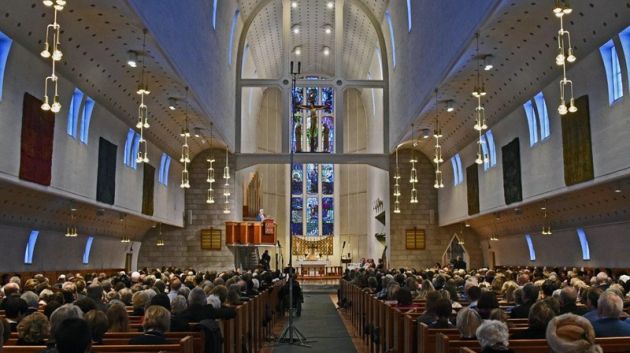Lutheran Church of Norway to separate from State after 500 years

One newspaper likened the separation of Church and State taking place at the end of this year in Norway to a divorce but secularists believe that the new dispensation does not go far enough.
International Business Times said Norway is asking for a divorce from its biggest, most important church.
The (Lutheran) Church of Norway and the Norwegian government will formally separate on Jan. 1 after nearly 500 years.
Norway has sought to formalize the separation of Church and State since it was ordered by the country's parliament eight years ago.
Under the new law, Norway's 1,250 priests and bishops will no longer serve as government officials appointed by the monarch, King Harald V.
From New Year's Day the Church of Norway will become an independent business, and it's a big deal in a nation that has been grappling with an influx of Muslims and how to ensure other religions have equal protection.
The Scandinavian nation is preparing for its "'biggest change to the Church since Reformation," The Local Norway reported.
"We are facing the biggest organizational change of the church since the Reformation," Jens-Petter Johnsen, the head of the Church's National Council, said. "The changes will create a clear separation between Church and State."
The law passed parliament nearly a decade ago transformed Norway's Constitution by erasing the phrase, "The Evangelical-Lutheran religion will remain the State's public religion."
Now it reads, "The Church of Norway, an Evangelical-Lutheran Church, will remain Norway's national church and will be supported as such by the State."
For some Norwegians, the separation does not go far enough and they argue the division of Church and State will be unclear.
"We will not be getting a real distinction. Parliament came part of the way this time, but not far enough," said Kristin Mile, the secretary general of the Norwegian Humanist Association (Human-Etisk Forbund - NHA).
Mille and those who support her cite one formulation that allowed the parliament to reach its compromise eight years ago: "Norway's national church."
"As long as the Constitution says that the Church of Norway is Norway's national church, and that it should be supported by the State, we still have a state church," asserted Mile.
The concept of a new "national church" bothers her as it constitutionally connects the Norwegian people to a particular denomination.
"It is in some ways worse than connecting a particular religion to the State," she said.
The new law seems unlikely to have an impact on church attendance in Norway.
The number of church members was previously a key factor in State funding and many churches falsely boosted the size of their congregations, Christian headlines reported. The Church's separation from the State will probably end such practices.
Like many other northern European countries, Norway has an extremely low church attendance rate: only five percent of Norwegians attend church.
The Church of Norway says on its website that around 73 per cent of Norway's population are currently baptized members.
Around 80 percent of Norway identifies as Christian but only a small number regularly attend church services, Premier reports.
The Christian faith came to Norway in the 9th century. It was brought to western Norway by missionaries from the British Isles, and to eastern Norway by missionaries from Germany and Friesland, by way of Denmark.
